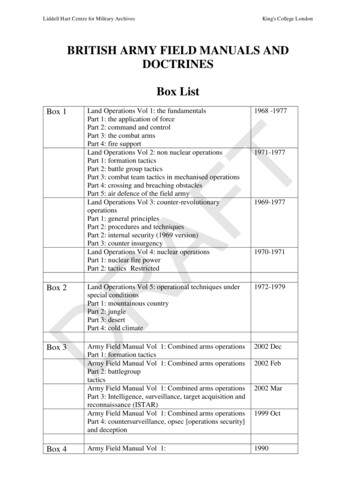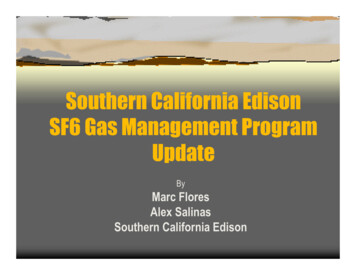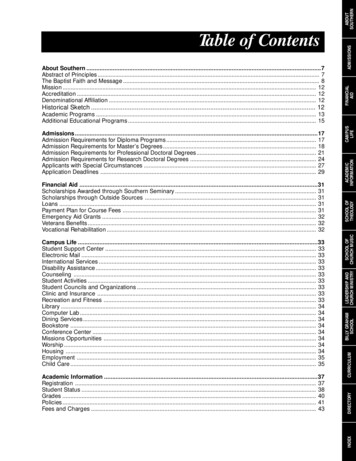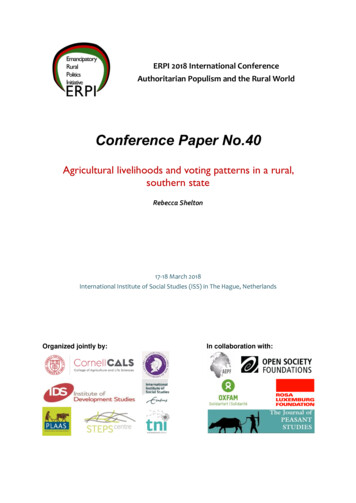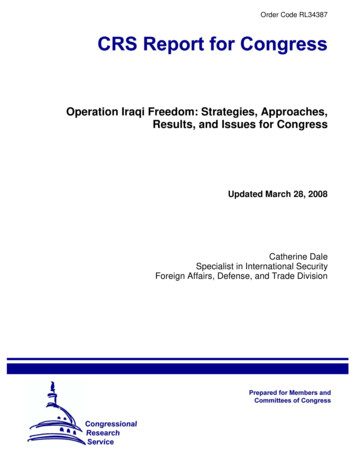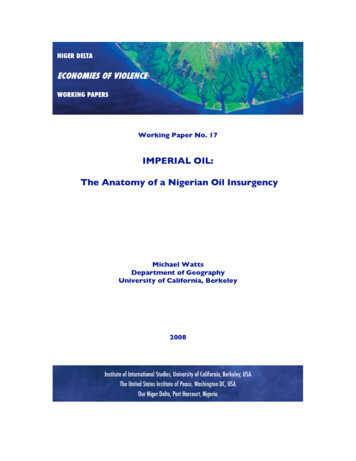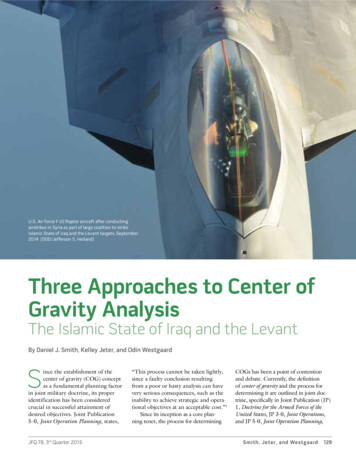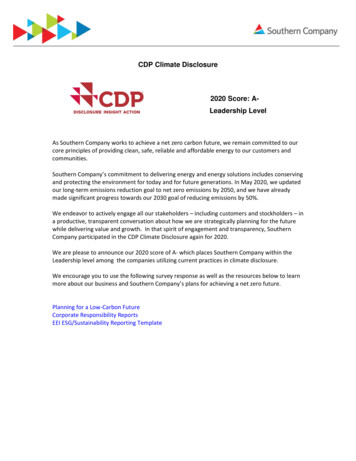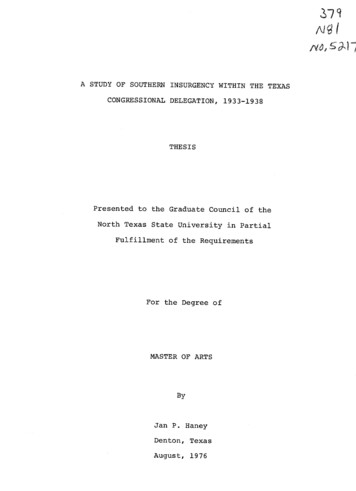
Transcription
I"7A STUDY OF SOUTHERN INSURGENCY WITHIN THE TEXASCONGRESSIONAL DELEGATION,1933-1938THESISPresented to the Graduate Council of theNorth Texas State University in PartialFulfillment of the RequirementsFor the Degree ofMASTER OF ARTSByJan P. HaneyDenton,TexasAugust, 1976
Haney,Jan P.A Study of Southern Insurgency Withinthe Texas Congressional Delegation,Arts1933-1938.Master of(History), August, 1976, 126 pp., bibliography,100titles.This study focuses upon the Texas congressional delegation from 1933 to 1938 in an attempt to determineextent of southern insurgency within that group.an examination of the Redeemer-insurgentsouthern politics since Reconstruction,theFollowingdichotomy inthe thesis analyzesroll-call votes on New Deal legislation concerning agricultural,financial,relief,and labor reform issues todemonstrate that a spiritof southern insurgency existedin Texas politics in the 1930's.The study concludesthat Morris Sheppard,Maury Maverick, W. D. McFarlane,Sam Rayburn,R. Ewing Thomason, andLyndon B. Johnson were politicians in the tradition ofsouthern insurgents.The influenceof these men,especiallySheppard, Rayburn, and Maverick, on the passage of legislation reflecting insurgent demands is demonstrated to besignificant.
01976JAN PATTON HANEYALL RIGHTS RESERVEDiii
TABLE OF CONTENTSChapterI.PageTHE NATURE OF SOUTHERN POLITICS,1877-1933.II.III.IV.APPENDIX.--. . . . . .1THE TEXAS DELEGATION AND AGRICULTURAL ANDFINANCIAL ISSUES OF THE NEW DEAL,1933-1938 -.-.-.-.29RELIEF AND REFORM AND THE TEXASDELEGATION . .67SOUTHERN INSURGENTS IN THE TEXASCONGRESSIONAL DELEGATION, 1933-1938.".89.-.-. .BIBLIOGRAPHY. . . .---.-.-.-.-.-.-.-.iv.117120
CHAPTER ITHE NATURE OF SOUTHERN POLITICS, 1877-1933Nearly one hundred 'years after the official end ofReconstruction in the South,the effects of the Civil Warand Reconstruction still influence the nature of politicsinTexas as in other southern states.Long after other sectionsof the United States had ceased to exploit the emotionalismof the war period in their political arenas,the South con-tinued to be influenced by a glorification of the LostCause and the myth of Reconstruction with the threat ofrenewed outside interference into the social and politicalaffairs of the section.The symbol of the lasting effectsof the war and Reconstruction upon southern politics isthefidelity the section maintained to the Democratic partyfrom1877 to about 1938 which led to the myth of the SolidSouth.Southern society, however, has always been "more complex,differentiated,indicate."'and internally at odds than myth wouldThesedifferences,therefore,in a one-partysystem have had to be contested most often within theranksof the Democratic party.1 DeweyW. Grantham, Jr., The Democratic South (Athens:University of Georgia Press, 1963), p. 2.For standardinterpretation see V. 0. Key, Jr., Southern Politicsin Stateand Nation (New York:Vintage Books, 1949).1
2During the 1870's, conservative Democrats gradually beganto wrest control of the state governments in the South fromthe Republicans who had been in power during the Reconstructionperiod.These men claimed to "redeem" the states from theexcesses of Republican rule and to return power to nativewhite southerners.These Redeemers would dominate southernpolitics until after the turn of the twentieth century, andalthough "they were often of the planter class and they actedand talked like traditional Southerners,.hardly in the old agrarian tradition." 2They drew support. . they werenot only from the historic centers of southern wealth andpower, the black belts, but also from the industrial centerswhich represented the commercial classes.3throw the Reconstruction governments,unusual party discipline,In order to over-these men had to requireand after they attained power,theRedeemers attempted to maintain control by recalling the pastand the myths of the Lost Cause and Reconstruction.4"They2 T.Harry Williams, Romance and Realism in SouthernPolitics (Athens: University of Georgia Press, 1961), pp.45-46.See C. Vann Woodward, Origins of the New South 18771913 (Baton Rouge:Louisiana State University Press, 1951),pp. 1-106.3 DeweyW. Grantham, Jr., "The South and the Politics ofSectionalism," in The South and the Sectional Image: TheSectional Theme Since Reconstruction, ed., Dewey W. Grantham,Jr.(New York:4 Williams,46.Harper& Row,1967),p.39.Romance and Realism in Southern Politics,p.
3told a grim story of human suffering and of thesouthern battle for civilization during Reconstruction,and their storybecame an article of faith in the household ofalmost everywhite Southerner."5These new leaders envisioned a newprosperity for the South based on "machines and-factories,not from unprocessed fields of white cotton,"and forged apartnership with northeastern capitalists toindustrialize andurbanize the South. 6The South, however, has never been a monolith.Diversi-ties and divergences have always existed among thesouthernpeople, not just between the races, but also amongthewhites.7Almost from the outset the Redeemer governmentswere faced with insurgent groups within the Democraticpartyand in splinter parties opposed to the businessorientationof the Redeemer leaders who supported the New Southideology.There was a conflict over which direction the Southshouldtake--should it align itself with the commercial,conserva-tive northeast or should it join its interestswith the moreradical, agricultural west?The conservative politicians incontrol attempted to avoid a conflict by maintainingthat5Grantham, The Democratic South, p.21.6 PaulM. Gaston, The New South Creed: A Study inSouthern Mythmaking (New York: Alfred A. Knopf,1970), pp.54, 219.See C. Vann Woodward, Reunion and Reaction:TheCompromise of 1877 and the End of Reconstruction (Boston:Little,Brown and Company,7 Carl1966).N. Degler, The Other South: Southern Dissentersin the Nineteenth Century (New York:Harper & Row, 1974),pp.2-3.
4economics had no relationship to politics.They believed "noissue must be permitted to divide white solidarity." 8Theywere not successful in holding down dissident elements, however, and insurgent groups continued to emerge to challengethe Redeemer dominance in southern politics.Although issueschanged from movement to movement and from state to state, inall of these insurgent uprisings,emerged,certain common elementssuch as concern for agriculture and economic affairs,reform measures, and the race problem.In the late nineteenth century,the insurgent movementsbegan among farming groups attempting to combat a governmentthey believed unresponsive to their needs, since the Redeemergovernments exhibited a definite favoritism toward commercial enterprises through tax exemptions or low taxassessments for railroads, utility companies, and insurancecompanies.In Texas, Governor Oran M. Roberts vetoed stateappropriations for schools because of a lack of funds, butsoon afterward he urged the legislature to exempt manufacturing capital from all taxes for the next ten years.9TheSouth at that time was overwhelmingly rural and agrarian;thus,many farmers believed that they were burdened by discrimination in the tax structure,railraods,in the rates charged by theand in the interest they were charged on loans.8 Williams,Romance and Realism in Southern Politics,p. 47.9York:Rupert N.Richardson,Prentice-Hall,Texas:1943), p. 330.The Lone Star State(New
5Many mantained that the Redeemer governments were corruptandcharged the conservatives with using the Negrovote to retainpower.Grievances such as these led to revolts withintheDemocratic party and the emergence of third-partygroups whooften referredto themselvesas Independents.One of the first Independent movements to emergeinTexas was the Greenback party,part of a national farmers'movement, which held its first state conventionat Austinin 1878.Formed to take positive action to remedy the tightcurrency supply brought about by the panic of 1873,10theGreenbackers declared that the old political partieshad"carried on a financial systemsoradically wrong as topauperize the masses to support a chosen few in idlenessandluxury." 1 1In their platform,the delegates to the conventionsupported issuance of the greenback dollar as legaltender,an overhaul in the tax structure, a graduated incometax,free public schools,reforms in the convict labor system,universal manhood suffrage,"no squandering of the publicdomain upon private corporations" and "honesty andeconomyin the administration of public affairs." 1 2That year the10Roscoe C. Martin, "The Greenback Party in Texas,"Southwestern Historical Quarterly 30 (1926-1927):163.11Ernest W.in Texasp. 181.12Winkler,(Austin:Ibid.ed.,Platforms of Political PartiesUniversity of Texas Bulletin No. 53,1916),
6Greenback party elected ten representatives to the statelegislature and one United States Congressman,Jones of Bastrop.13Goerge W.In 1882, Jones ran for governor on anIndependent ticket supported by a fusion of Greenbackers andRepublicans,gaining the largest popular vote ever polled bya losing candidate in Texas to that time.1 4The party was losing strength, however, and waged itslast campaign in Texas in 1884.The reasons for the failureof the Greenback party foreshadowed the eventual failures ofall later insurgent efforts.The Greenback party was "atbest no more than a group of dissatisfied DemocratsandRepublicans, political malcontents who were only too willingto return to the fold of their respective parties" afterexisting several years with few tangible results.A moreimportant reason for the failure stemmed from the fact oftenone or both of the major parties recognized and incorporatedin their own platforms some of the demands of the Greenbackparty.15Time and again Democrats would use this method toundermine insurgent political uprisings,a technique par-ticularly significant in view of the psychological difficultysoutherners experienced when breaking away from the Democratic party.The Greenback movement was not distinct fromother national or local agrarian movements.It was simply"a chapter in the story of the liberation of the farmer, and1 3 Martin,14"The Greenback Party in Texas," p. 169.Ibid., p. 171.15Ibid., p. 176.
7not . . an organization isolated from others immediatelypreceding and following it."16Other insurgent movementswere active in the South during the 1870'sand 1880's including the important Readjuster movementin Virginia, the "liberal"party in North Carolina,as well as other Greenback movementsin states such as Mississippi and Alabama.7The questionof Negro political activity plagued theIndependents.InVirginia the insurgent Readjusters madea decision to includeblacks in their movement,and the call to the convention "was'issued without distinction of color.'"1 8Until that timethe attitude of the Redeemer leaders towardthe Negro hadbeen paradoxical.In an attempt to prevent division withinthe Democratic party these men had employedthe specter ofNegro-Republican control during Reconstruction;however,did not deny suffrage to the Negro.theyThis was not merelybecause of a fear of further northerninterference but alsoin consideration of practical politics.As the vote of a propertyless class, itwas somethingto be watched and kept in hand.But as the vote ofan inferior and inert people, it wassomething thatcould be manipulated for the benefit ofthe richwhites, the only class that had themeans to do themanipulating.16Ibid.,17Degler,p. 162.The Other South,p.288;Albert D.Revolt of the Rednecks:Mississippi Politics(Lexington: University of Kentucky Press,1819p. 49.Degler,The Other South, p.Kirwan,1876-19251951), p. 21.276.Williams, Romance and Realism in SouthernPolitics,
8The Readjusters realized that in order to overthrowtheentrenched Redeemer government in 1878 Negro voteswould haveto be won over.2 0William Mahone and his followers attemptedto place class interests above race interests andsucceededfor a time.The combination of insurgent white and Negro votes,however, which led to the success of the readjsutersalsocaused their demise.The conservative Democrats were quickto seize upon the racial issue and begin a cry of "racetreason." 2 1In Virginia,as well as in other states whereinsurgents attempted to win Negro votes,the conservativeforces fought back with cries for white solidarity;that proved ineffective,and ifthey used fraud and violence inorder to retain political control.Once the issue of racewas injected into the battle, third-party men hadlittlechance.22Although only the Readjuster movement could actuallyhave been considered a success,these dissenting groups hadtheir impact upon southern politics; and even thoughtheparty died,"agrarian discontent lived on,to be stimulatedinto renewed activity by the hard times of theearly nineties." 2 3In the later movements as in the early Independentefforts, many of the issues involved mattersof economics,reform, and race.2021Degler, The Other South,p. 277.Woodward, Origins of the New South, p. 104.22Ibid., p. 105.23Richardson, Texas, p. 328.
9As in the rest of the South,in Texas during the decadesfollowing the Civil War the attitude toward businesswasfriendly.In spite of criticism by the Grange and theGreenback party,the dominant party continued to encouragecapital and advocated few regulatory measures.During the1880's the demand for regulation increased andthe number ofpeople dissatisfied with the Redeemer elementsin governmentgrew rapidly.failed to pass,In 1887, after a series of regulatory billsthirty-two members of the legislature, mostlyrepresenting the farmers,signed a protest against theircolleagues.24During the eighties a new agrarian crusade beganinTexas as the Farmers' Alliance.In 1887 the leader of theAlliance in Texas, Dr. C. W. Macune, organizedthe NationalAlliance, which in Texas and throughout theSouth attemptedto secure certain reform measures and concessionsfor thefarmer through the Democratic party.2 5As the year 1890approached the farmers increasingly sufferedunder most ofthe same conditions they had complained of sincethe end ofthe war.Problems with the system of taxation, with regu-lation of monopolies, especially the railroads,as well asthe shortage of currency still existed.pressure from the Farmers' Alliance,24Ibid.,p.25In Texas,throughthe Democrats wereforced351.Roscoe C. Martin, The People's Party in Texas:AStudy in Third Party Politics (Austin:University of TexasBulletin No. 3308, 1933), pp. 23-24.
10to take action on the major grievance of railroad regulationby nominating for governor James S. Hogg who supported theproposition for a railroad commission. 2 6Hogg disappointedAlliance members when he ignored an Alliance request that oneof their leaders be appointed to the railroad commission.This disillusionment with the Democratic party along withother factors prepared Texas farmers to make a break from theDemocratic ranks and enter the Populist party when it organized.2 7Throughout the South, the Alliance made its presencefelt by the conservative forces.While working within theDemocratic party they were able to elect six governors whosupported Alliance principles, claimed a majority in eightstate legislatures, and had over fifty Congressmen pledgedto the Alliance platform.2 8The conservatives fought againstmany Alliance proposals, however, and the nomination ofGrover Cleveland by the Democrats in June,1892, encouragedsoutherners to bolt the Democratic party and join the newlyformed Populist party.29Persuaded that the southern masseswere being deprived of all hope for the future by the economic and political system established by the Redeemers,"the desperate agrarians who joined in the Populist movementnaturally fixed on the New South doctrine of progress,2 6 Ibid.,p.2 8 Woodward,2925.2 7 Ibid.,p.29.Origins of the New South, p.Ibid., pp. 242-43.235.
11prosperity,sectional reconcilliation, and racial harmonyastheir principal target. "30Not surprisingly,the agrariansopposed the ideas of the Redeemers because historically,from the days of Thomas Jefferson,"the South fought longestagainst the triumph of commercial and industrial capitalism. "3 1The Populist movement invigorated the politicsof theSouth and brought to the surface divisionswhich the Redeemershad never been able to completely suppress.Along with thechallenge to the New South doctrine, it ledto a "revival ofJeffersonian and Jacksonian principlesconcept of positive government." 3 2[asnd]popularized theThe basic ideology behindthe Populist movement was expressed in the oldercreed of"equal rights to all,special privileges to none." 3 3Theybelieved that the working men and especiallythe agriculturalclasses had been subjected to economic inequalitiesthatcould only be adjusted by government regulation.lation failed to eliminate economic inequality,If reguthey thenmaintained government control would be necessary,30Gaston, The New South Creed, p.and as a220.31William G. Carleton, "The ConservativeSouth--APolitical Myth," Virginia Quarterly Review22 (1946):180-81.32Grantham,p. 40.3 3 Martin,"The South and the Politics of Sectionalism,"The People's Party in Texas, p. 46.
12last resort, public ownership of all industrieswhich affectedthe public interest should be considered.3 4The Populists, also concerned with the government'sresponsibility in other economic areas,demanded the abolitionof the national banking system, an enlargementof currency incirculation, and a system of commodity creditsimilar to thesubtreasury plan.They called further for the repossessionof large quantities of land and resources for corporations.35This opposition to alien ownership of landwas particularlystrong in Texas.The state had maintained a policy of liberalland grants to railraods, and a total of32,250,000disposed of in this fashion,Alabama.acres werean area as large as the state ofCritics claimed that possession of thisland, prin-cipally by holding companies, retardedthe development of thestate and led to an inequitable tax structure.36The rise of Populism had an impact onsouthern politicswhich transcended mere economic issues.According tohistorian, T. Harry Williams,Southern Populism collided full tilt withthe wholeedifice of Southern politics, with theromanticattachment to images of the past; withthe separation of politics and economics; with theentombingone-party system; and with the folk unityforged byReconstruction.The Populists talked the languageof economics and self-interest.They spoke of classconsciousness and class legislation,of combining34Ibid.35Woodward, Origins of the New South, p.36Richardson,Texas, p.350.250.
13farmers and laborers and sections inone party, ofusing government to solve economicproblems.Mostalarming of all, they said that economicself-interesttranscended race.They proposed to fit the Negro insomewhere in their great combination. 37The Southern Populists,national Populist movement,the most radical elements of thebased their political strategy on"combinations and alliances along regional,lines."class,and racialThey proposed an alliance between theSouth and theWest, between the farmers and cityand factory laborers,and"a practical union with Negro farmersand laborers within theSouth." 3 8The Populists expanded upon the ideas of theearlier Independent movements in theirstress on a class consciousness which cut across sectionaland racial lines.The alliance with the Negro was themost important tothe success of Southern Populists.had the Readjusters,This group realized,asthat only through a fusion of whiteinsurgents with Negroes and Republicanswas there a chanceof overcoming the control of the Redeemers.Negroes wereactively encouraged and were electedto party councils inTexas and in other states and weregiven a voice in the party39organization.Texas could claim one of the most effectiveNegro Populists in J. B. Rayner,party to join with the Populists.who bolted the RepublicanHe was extremely influential37Williams, Romance andRealisminSouthern Politics,mp. 52.i38msWoodward,Origins of the New South,9Ibid.,p.256.p.252.
14in bringing other Negroes into the party.4 0As with theprevious attempts to form political unions along economicclass lines,the necessity of fusing with Republicans andactively campaigning for Negro support contributed to thefailure of the Populists.Populist leaders,Regardless of the sincerity of thethe majority of the people to whom Populismhad the greatest appeal"cherished stronger feelings on racethan any other group in the South." 4 'The Redeemer againemployed charges of race treason, violence,intimidation, andcorruption in an attempt to destroy the Populist party.adoption of certain Populist issues,Thesuch as a free silverplatform, in addition to the race conflict, finally killedthe Populist movement following the 1896 election.When theDemocrats nominated William Jennings Bryan for president in1896, the Populists were faced with a serious dilemma, havingfought against the Redeemers in alliance with Republicans atthe local level, yet in 1896, they were expected to fuse withthe Democrats at the national level.The pattern of confusion that had betrayed the Independents and Readjusters in the seventies and eightieshad been repeated in the nineties.With the agrarianradicals in alliance with the party of big business andparty of white supremacy in combination with Negroesagainst lower class whites, it was little wonder thatthe masses lost confidence and became apathetic.4 24 0 Martin,The People's Party in Texas, pp.4 1 Williams,p.94-96.Romance and Realism in Southern Politics,53.4 2 Woodward,Origins of the New South,pp. 288-89.
15It is ironic that the force which seemed to launchthemost formidable opposition to the New South creed ultimatelyassured the longevity of the Redeemer elements.defeat of Populism,After thethe new wave of Redeemer leaders builttheir political machines upon the models of the old orderandwere more strongly entrenched than before.43Once again,"the black belts and their allies overcame their opponentsandused the specter of insurgency as a means of suppressingfuture nonconformity."From 1896 until the mid-twentiethcentury, white southerners never again in any significantnumbers participated in a third-party movement.The bitterexperiences of Populism made them determined to confineanyfuture political battles within the Democratic party.the Populist defeat in 1896,Afterconservatives and insurgentsresolved to prevent Negroes from becoming the balanceofpower in the South.Thus in addition to any constructivemeasures achieved by the Populists,a move for black disfranchisement.45they also contributed toDisfranchisement of theblacks was initiated soon after the 1896 electionand completed and maintained by the Progressives who emergedas aninsurgent group in the early twentieth century.43Gaston, The New South Creed,of the New South, p. 290.44p. 38.45Grantham,Origins"The South and the Politics of Sectionalism,"Monroe L. Billington,Twentieth Century (New York:p. 14.p. 220; Woodward,The Political South in theCharles Scribner's Sons, 1975),
16The Progressive movement, extending from about 1900 to1914,represented the second phase of a reform movement whichlasted from about 1890 to World War II.This "surge of reform,though largely turned back in the 1890's and temporarilyreversed in the 1920's, has set the tone of American politicsfor the greater part of the twentieth century."46In manyways the Progressive movement in the South was similar tothemovement in the North.The South,as the rest of the country,had been affected by the problems of industrialization andfinancial difficulties.The reformers of this period in theSouth were generally urban and middle-class,small-town professionals.tralization,businessmen orTheir views on government cen-federal power,improved public services,andregulation of corporations were similar to those of northernProgressives.But the southern movement was influenced bythe agrarian crusade of Populism,and in the South ruralsoutherners often aligned themselves with their urban counterpart "to oppose a common enemy in the early 1900' s,bringinga unique and distinct flavor to the Progressive movementinthe South." 4 7Although both Populism and Progressivism attackedbigness and proposed a restoration of the economicposition ofthe common man,Progressivism advocated more moderate reforms46Richard Hofstadter, The Age of Reform: From Bryan toF. D. R. (New York: Alfred A. Knopf, 1955), p.3.47Billington,The PoliticalSouth,p.3.
17of the economy and avoided the extreme rhetoric of Populism.4 8In fact,it was often difficult to distinguish between theconservative Democrats and the insurgent progressivessimplyon the basis of their programs.Since the conservative wingof the party had overcome previous insurgency by adoptingvarious aspects of the platform, on many issues the conservatives and the progressives advocated similar measures.However, the progressives solicited the support ofa differentgroup than did the conservatives.The progressives appealedto the common man and "served as a safety valve forthe discontented." 4 9There was also a difference in the definitionsof conservative and progressive.Whereas the conservativeattempts to maintain the status quo by a "reasonedorunreasoned resistance to change,"progressive" implies aphilosophy that welcomes innovations and reforms in thepolitical, economic, and social order."Progressives alsoattempt to assure the people a "broader control oftheirgovernments. "50Few Progressive leaders were concerned about theparadoxbetween their progressive ideas and their advocacyof blackdisfranchisement.Although the laws affecting disfranchise-ment were written principally by the Redeemer governments,48Williams, Romance and Realism in SouthernPolitics,p. 58.4950Billington,Arthur S.The Political South, p.Link,9."The Progressive Movement in the South,1870-1914," North Carolina Historical Review 23(1946): 172.
18they were generally supported by the progressives as a partof the campaign to clean up southern politics.Maintainingthat the tendency of both Redeemers and insurgents to purchase black votes led to a corruption of the politicalsystem, many progressives turned to race baiting in order toattract white votes.Thus even when the Negro was removedfrom the practical political arena,the politics of theSouth continued to revolve around the race question.5 1The events of the Progressive period show, however, that"Southern politics was far more than a politics of sectionalism or Negrophobia." 5 2Real economic and social differencesdivided southerners, and at times,the progressives wereable to put their beliefs into action.Although everysouthern legislature and governor did not support all progressive reform, some of the measures that were passed invarious states included unfair practices laws, child laborlegislation,safety and inspection procedures for mills andmines, pure food and drug laws,penal reform measures, pro-hibition, appropriations for charitable institutions, bridges,and highway systems.They also passed laws which attemptedto remove graft and corruption from southern politics.5 3general,progressives advocated democratic reforms such as51Key, SouthernPolitics in Stateand NationBooks, 1949), p. 5.52Grantham,53Billington,The Democratic South, p. x.The Political South, p. 6.(VintageIn
19the party primary to bring government closer to the people;efficiency in government which would eliminate waste;government action against abuses by corporations andmonopolies;social legislation which included reforms fromprohibition to labor legislation; and an extension ofgovernmental responsibilities to include a wide range ofdirect services to the people including good roads,cation, public health services, welfare,edu-rural credits, andconservation.5 4As in other periods of insurgency, a significant amountof competition existed in intraparty politics during theProgressive era which reflected the historic divisionsandchanging nature of southern society.5 5These divisionsexisted in Texas politics as they did throughout theSouth.At the turn of the century Texas politics wasdominated by the conservative wing of the Democratic partyunder the leadership of men such as Senator Joseph W. Baileyand E. M. House.Their views reflected the increasingimportance of business and industrial elements in theeconomy and politics of Texas, and their business viewspermeated the administrations of Charles A. Culberson,54George B. Tindall,"Business Progressivism:Politics in the Twenties,"South Atlantic QuarterlyS. W.Southern62(1963) : 93.55p. 42.Grantham,"The South and the Politics of Sectionalism,"
20Lanham, and Joseph D. Sayers; 5 6 however, by 1906, publicsentiment swung away from conservatism and Thomas M. Campbellwas elected governor.He favored an anti-lobby law,reform, and generous support of state institutions.taxOnce inoffice he urged passage of the Robertson insurance law whichstrictly regulated the insurance business in the state.5 7In the early part of the century the influence of southern progressives was beginning to be observed at the nationallevel.Of the hundred-odd southern congressmen in any givenCongress during this period, approximately twenty-five"revealed more than passing Progressive tendencies." 5 8Theysupported and often initiated progressive measures, thusexposing "as myth the idea that only die-hard conservativesrepresented the South." 5 9The influence of southerners in Washington increasedafter Woodrow Wilson was elected president in 1913.progressives,Texasstruggling against the entrenched power ofthe Bailey machine,"produced the most effective Wilsonorganization in the nation. "Although the Texas progressives56Alwyn Barr, Reconstruction to Reform: Texas Politics,1876-1906 (Austin: University of Texas Press, 1971), p. 247.57Richardson,Texas, pp.58Billington,The Political South, p.59Ibid., p.603
Haney, Jan P. A Study of Southern Insurgency Within the Texas Congressional Delegation, 1933-1938. Master of Arts (History), August, 1976, 126 pp., bibliography, 100 titles. This study focuses upon the Texas congressional dele-gation from 1933 to 1938 in an attempt to determine the extent of southern insurgency within that group.
